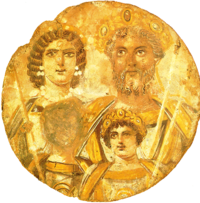Alexander Severus
| Severus Alexander | |||||
|---|---|---|---|---|---|

Bust of Severus Alexander
|
|||||
| 26th Emperor of the Roman Empire | |||||
| Reign | 11 March 222 – 18/19 March 235 | ||||
| Predecessor | Elagabalus | ||||
| Successor | Maximinus Thrax | ||||
| Born |
1 October 208 Arca Caesarea, Syria Phoenicia Province (modern Akkar, Lebanon) |
||||
| Died | 19 March 235 (aged 26) Moguntiacum, Germania Superior |
||||
| Spouse |
Sallustia Orbiana Sulpicia Memmia |
||||
|
|||||
| Imperial Dynasty | Severan | ||||
| Father | Marcus Julius Gessius Marcianus | ||||
| Mother | Julia Avita Mamaea | ||||
| Full name | |
|---|---|
| Marcus Julius Gessius Bassianus Alexianus (from birth to adoption); Caesar Marcus Aurelius Alexander (from adoption to accession); Marcus Aurelius Severus Alexander Augustus (as emperor) |
| Roman imperial dynasties | |||
| Severan dynasty | |||
 The Severan Tondo |
|||
| Chronology | |||
| Septimius Severus | 193–198 | ||
| —with Caracalla | 198–209 | ||
| —with Caracalla and Geta | 209–211 | ||
| Caracalla and Geta | 211–211 | ||
| Caracalla | 211–217 | ||
| Interlude: Macrinus | 217–218 | ||
| Elagabalus | 218–222 | ||
| Alexander Severus | 222–235 | ||
| Dynasty | |||
|
Severan dynasty family tree All biographies |
|||
| Succession | |||
|
Preceded by Year of the Five Emperors |
Followed by Crisis of the Third Century |
||
Severus Alexander (Latin: Marcus Aurelius Severus Alexander Augustus; 1 October 208 – 19 March 235) was Roman Emperor from 222 to 235 and the last emperor of the Severan dynasty. He succeeded his cousin Elagabalus, upon the latter's assassination in 222, and was ultimately assassinated himself, marking the epoch event for the Crisis of the Third Century — nearly 50 years of civil wars, foreign invasion, and collapse of the monetary economy, though this last part is now disputed.
Alexander was the heir apparent to his cousin, the 18-year-old Emperor who had been murdered along with his mother Julia Soaemias, by his own guards, who, as a mark of contempt, had their remains cast into the Tiber river. He and his cousin were both grandsons of the influential and powerful Julia Maesa, who had arranged for Elagabalus' acclamation as emperor by the famous Third Gallic Legion. It was the rumor of Alexander's death that triggered the assassination of Elagabalus and his mother.
As emperor, Alexander's peace time reign was prosperous. However, militarily Rome was confronted with the rising Sassanid Empire. He managed to check the threat of the Sassanids, but when campaigning against Germanic tribes of Germania, Alexander attempted to bring peace by engaging in diplomacy and bribery. This alienated many in the Roman Army and led to a conspiracy to assassinate and replace him.
Under the influence of his mother, Alexander did much to improve the morals and condition of the people, and to enhance the dignity of the state. He employed noted jurists to oversee the administration of justice, such as the famous jurist Ulpian. His advisers were men like the senator and historian Cassius Dio, and it is claimed that he created a select board of 16 senators, although this claim is disputed. He also created a municipal council of 14 who assisted the urban prefect in administering the affairs of the 14 districts of Rome. Excessive luxury and extravagance at the imperial court were diminished, and he restored the Baths of Nero in 227 or 229; consequently, they are sometimes also known as the Baths of Alexander after him.
...
Wikipedia
